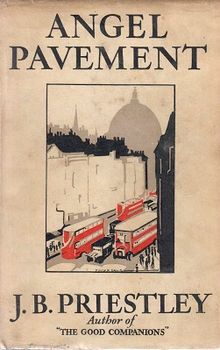- Messages
- 17,483
- Location
- New York City
"Little Golden America: Two Soviet Humorists Survey These United States," by Ilya Ilf and Eugene Petrov.
This is one of the most extraordinary documents of everyday America in the 1930s ever published. Ilf and Petrov were the most popular humorists in the USSR -- their novels dealing with the expansive Kingfish-like con man Ostap Bender remain beloved in Russia down to the present day, and their most popular book, "The Twelve Chairs," is known around the world, having been adapted for the screen in the US by such disparate talents as Fred Allen and Mel Brooks. But this isn't a novel.
In 1935, Ilf and Petrov decided to do a travel book about the United States, to be serialized in Pravda, and published in the US by Farrar and Reinhart. They traveled to New York on board the Normandie -- third class -- and once there they bought a cheap "mouse colored" Ford sedan, and accompanied by a rather comical former engineer from General Electric and his wife, set out to drive all the way to California and back, exploring the whole breadth of the country along the way. The idea was not to do a political or economic critique -- but rather, to simply see what ordinary Americans were really like.
Ilf and Petrov had a photographic eye for what they saw, and they didn't miss a detail, with rich descriptions of everyday life: the cigarette packs tightly stacked in rows at the hotel concession stand, the way newspapers were piled on the sidewalk under a brick, and the way purchasers would just take a paper and drop their pennies on the pavement next to the stack, the ornate, swirling braid on the uniforms of the elevator operators. But they also were mystified by much of what they saw -- the idea of multiple brands of cigarettes, which seemed to be identical in every way but for their packaging, the odd tastelessness of the nicely-presented but utterly bland processed foods Americans ate in great quantities, and the all-engulfing waves of advertising which pummeled the motorist at every turn -- when they finally break down and try a Coca-Cola, they sardonically declare that the advertising is absolutely right, and that Coca-Cola will refresh you, invigorate you, and make you a genius like Tolstoy. They saw American consumer society, but they weren't impressed by it. They were fascinated by New York, but thought Chicago was the ugliest city on Earth, a "great spreading fungus" on the shores of Lake Michigan. Hollywood dazzled them, and their negotiations to try and sell the story of their trip to the movies provided a rather hilarious experience in how Americans do business. And the racism they observed in the South made no sense to them at all.
What impressed them most was the open friendliness of the American people -- everywhere they went people welcomed them, treated them with kindness, invited them to their homes, served them drinks. But it mystified them that very rarely did these people ever actually ask them about themselves or really show an interest in getting to know more about them. They couldn't understand what seemed to be an inherent lack of curiosity in Americans about the rest of the world.
Thru the connections of their traveling companions, Ilf and Petrov met quite a few celebrities along the way. They shared drinks with Ernest Hemingway and were invited to visit him in Florida for a fishing trip. They received an audience with Henry Ford, who came across to them as a raw-boned rural grandfather. They sat in awe as Sister Aimee Semple MacPherson delivered a thunderous sermon. And they stood by on a Warner Brothers soundstage to watch the filming of Marc Connelly's "Green Pastures." They set out to see America, and they certainly saw it. Their conclusion after all their adventures? Americans are a lovely people, living in a lovely country, but they wouldn't especially want to live there.
They brought a lot of souvenirs home from the trip -- but they also brought tuberculosis. Ilf died from it shortly before the book was published in 1937. Petrov went on to become a straight journalist, and was killed in action as a war correspondent in 1942. The book is still in print to this day, and someone really does need to make a movie of it. I'll volunteer to write the screenplay.
Interesting. I'm surprised I never heard of it.




